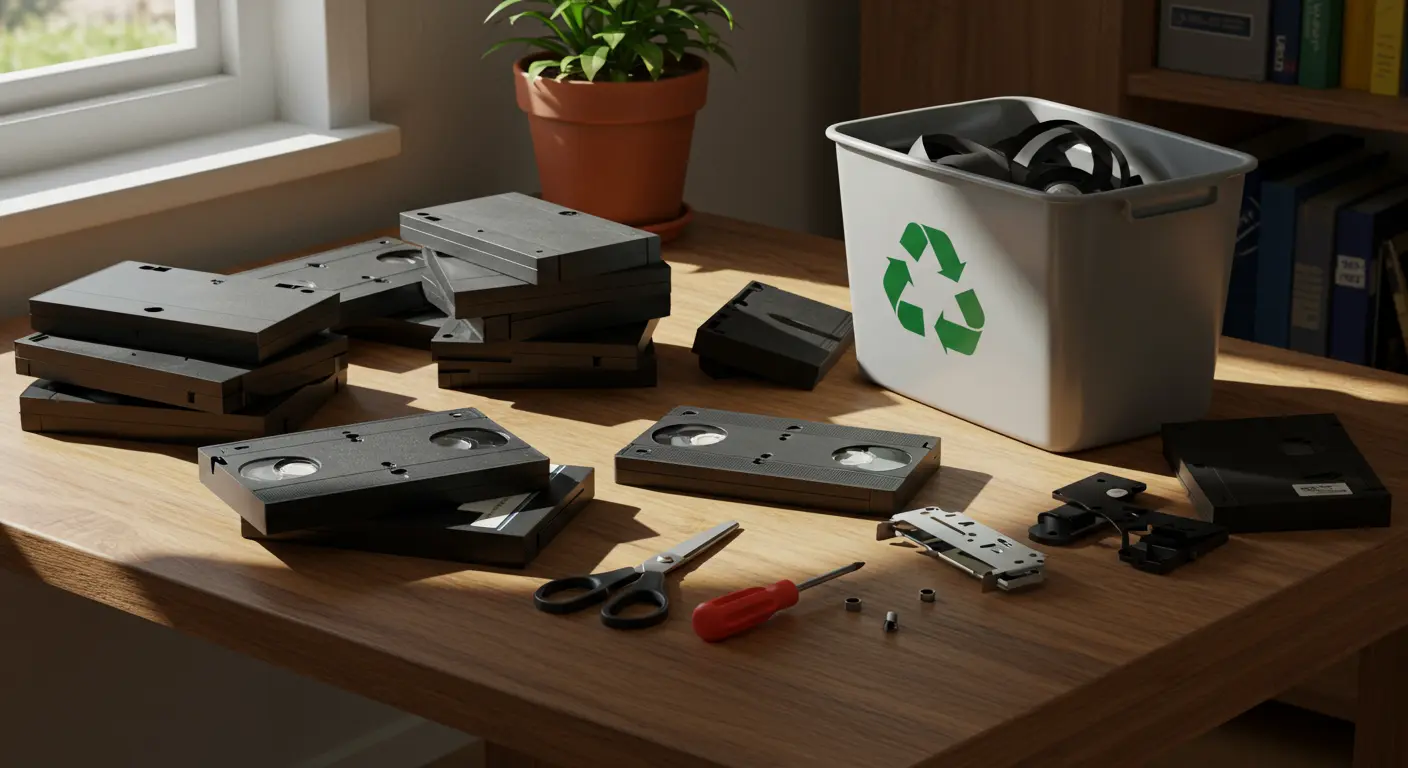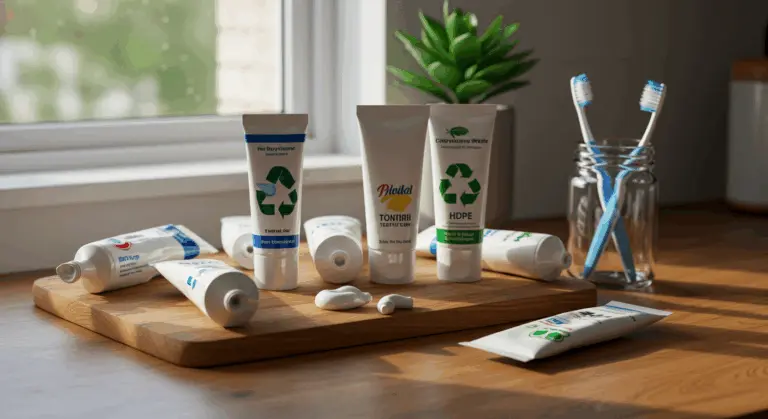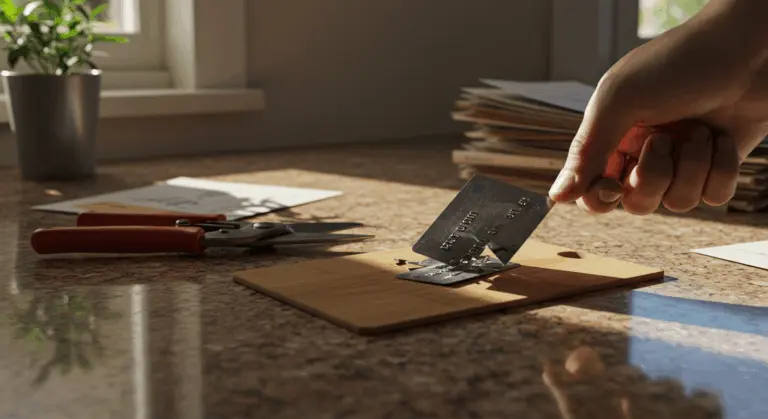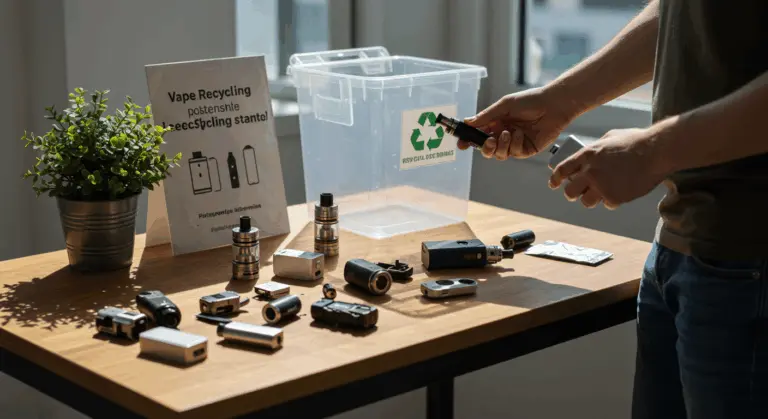Understanding VHS Tapes and Their Components
VHS (Video Home System) tapes once dominated home entertainment, serving as the go-to medium for movie nights and capturing precious TV moments. These rectangular cassettes house 1/2-inch magnetic tape that preserves standard-definition video, typically offering 120 to 240 minutes of recording time. A VCR (Video Cassette Recorder) was essential for playback—a device that’s now a relic of the past.
The anatomy of a VHS tape reveals two fundamental materials: a robust outer shell crafted from #5 plastic (polypropylene) and an inner magnetic tape made of Mylar (polyethylene terephthalate), coated with metallic particles that capture and store audiovisual data.
This intricate blend of materials—further complicated by tiny metal screws and springs—creates a recycling nightmare. It’s precisely this complex composition that demands specialized disposal methods to safeguard our environment.
Preparing for VHS Tape Disposal
Before disposing of your VHS tape collection, knowing the environmental impact is important. These seemingly innocent cassettes harbor a cocktail of plastic, metal, and potentially hazardous materials that cause damage when discarded carelessly. The magnetic coating contains metals that seep into soil and groundwater in landfills, while the plastic casing persists for centuries, refusing to decompose.
Start by taking inventory of your collection. Are there tapes with irreplaceable sentimental value that deserve digitization? For those destined for disposal, check them for sensitive personal content—you wouldn’t want strangers stumbling upon private moments if you choose donation.
Next, sort your tapes strategically by condition and content. Set aside tapes in pristine working order—these make excellent donation candidates. Damaged or degraded tapes? They’re better suited for recycling. Commercial movies with enduring popularity often find new homes more easily than obscure recordings or personal home videos.
Before taking action, reach out to your local waste management authority for area-specific guidelines. Some municipalities impose special requirements or designate specific collection points for items containing hazardous materials. This approach ensures compliance with local regulations while maximizing environmental protection.
Eco-Friendly VHS Disposal Options
With your collection properly prepared, it’s time to explore eco-conscious disposal options that prevent VHS components from contaminating our environment.
The most environmentally sound disposal methods are:
-
Recycling through specialized facilities.
-
Participating in community e-waste collection events.
-
Donating or creatively reusing tapes to extend their life.
Recycling Centers for VHS Tapes
Locating dedicated recycling centers for VHS tapes can be difficult—most standard facilities and charity shops have stopped accepting these mixed-material items altogether.
Fortunately, San Francisco Bay Area residents have Green Citizen Eco Center as a specialized solution. Located at 1831 Bay shore Highway, Suite 2, Burlingame, CA 94010, this facility accepts VHS tapes for proper recycling Monday through Friday from 10 AM to 6 PM. If you’re outside this area, it’s worth contacting local e-waste recyclers to inquire about VHS tape acceptance before making the trip.
E-Waste Collection Events
E-waste collection events provide an excellent option for responsible VHS disposal. Cities and municipalities regularly organize these community-driven initiatives where residents can drop off obsolete electronics—VHS tapes included—for proper recycling. These events typically occur multiple times yearly and feature professionals trained in electronic waste handling.
To find these events, check your local government website, community bulletin boards, or call your city’s waste management department to find upcoming collection dates. Most events welcome residents free of charge, though quantity limits or residency verification may apply. The benefit of these collection events is that they ensure your VHS tapes are processed through appropriate recycling channels rather than ending up in landfills.
When attending an e-waste collection event, preparing ahead helps. Remove paper inserts (these can join your regular recycling) and pack tapes securely to prevent transport damage. Many events accept other obsolete media formats too—audio cassettes, floppy disks, CDs—letting you declutter multiple media types in one efficient trip.
Donating or Re-Using VHS Tapes
Consider breathing new life into quality tapes through donation. Always call ahead to confirm acceptance. Potential recipients include:
Tossing VHS tapes in regular garbage should be your absolute last resort given their environmental consequences. If circumstances force this option, consult your local waste management facility first—some areas maintain strict e-waste regulations.
DIY Recycling Methods for VHS Tapes
For those seeking a hands-on approach to VHS disposal, DIY recycling methods can significantly reduce environmental impact while potentially transforming outdated media into something useful. The key is understanding VHS components and how they can be separated and repurposed effectively.
Begin by carefully dismantling the VHS tape. Using a small screwdriver, remove the screws from the plastic casing to separate the shell. Inside, you’ll discover multiple components: the plastic outer case, the magnetic tape itself, small metal screws, and various plastic internal parts. The #5 polypropylene plastic case is often recyclable, but you should verify this with your local recycling center.
The internal magnetic tape poses greater recycling challenges. This Mylar tape, coated with metals like chromium dioxide, demands special handling. While conventional recycling can’t process the tape easily, creative Divers have found creative ways to reuse it—art projects, jewelry, decorative items, or even durable craft rope.
VHS cases offer abundant upcycling possibilities. Transform them into storage solutions for office supplies, sewing materials, or electronic components. Crafty individuals convert them into unique picture frames, wall organizers, or miniature planters for small succulents. Their durable construction makes them perfect for various household storage needs.
While DIY methods provide creative repurposing opportunities for VHS components, remember that magnetic tape contains potentially hazardous materials requiring careful handling. Professional e-waste recycling remains the safest option for tape disposal. Why not combine approaches? Repurpose plastic components yourself while entrusting magnetic tape to specialized facilities that can process it safely and responsibly.
Separating Components of VHS Tapes
Effective VHS recycling requires separating components, each demanding different disposal methods. Start with a small Phillips-head screwdriver to remove the five or six screws typically located on the tape’s underside. Once opened, you can access and properly sort all internal components.
The main components you’ll encounter include:
-
Outer Plastic Shell: Usually #5 polypropylene, this is often recyclable in municipal programs (verify locally).
-
Magnetic Tape: Mylar coated with metals. This is the most challenging part and should be sent to a specialized e-waste facility.
-
Metal Screws, Pins, and Springs: These can be collected and recycled with other scrap metal.
-
Plastic Reels and Internal Mechanisms: These can sometimes be recycled with the outer shell, depending on the plastic type.
Always wear gloves and work in well-ventilated spaces when dismantling tapes—the magnetic tape can release harmful substances during handling.
Plastic Recycling from VHS Tapes
To locate specialized recyclers, use online resources like the Earth 911 database (search “videotapes”) or explore your local government’s waste management website for guidance.
Environmental Impact of VHS Tapes
VHS tapes create environmental problems that many people don’t consider when decluttering old media collections. These deceptively simple plastic rectangles contain sufficient toxic material to earn e-waste classification, despite lacking the obvious circuit boards or batteries found in other electronic waste. Their environmental footprint extends far beyond mere landfill presence.
The magnetic tape itself presents the primary environmental hazard. Coated with metals like chromium dioxide or iron oxide, these substances gradually leach into soil and groundwater as tapes decompose in landfills. This contamination travels through watersheds, potentially affecting drinking water supplies and aquatic ecosystems miles from the original disposal site. A single tape contains minimal metals, but billions of tapes create substantial cumulative impact.
Beyond toxic components lies another environmental challenge: the sheer volume of non-biodegradable materials. Polypropylene cases and polyethylene terephthalate (Mylar) tape persist for centuries in the environment. As these plastics slowly break down, they fragment into microplastics that infiltrate food chains and water systems, creating nearly impossible-to-remediate pollution.
Climate impact adds another layer of concern. Plastic decomposition in landfills releases greenhouse gases, while the original manufacturing process consumed significant resources and energy during VHS’s dominant decades. Proper recycling can partially offset this historical carbon footprint by reducing virgin plastic production needs.
Digitizing content provides a smart solution—preserving cherished memories while enabling responsible physical media disposal. Digital files require zero physical storage, allow easy backup and sharing, and eliminate energy-intensive VCRs, further shrinking environmental footprints.
Finding Reliable Digitizing Services
When choosing a digitization service, consider the following factors:
-
Customer Reviews: Look for consistently positive reviews across multiple platforms for insight into quality and reliability.
-
Transparent Pricing: Reputable services offer clear pricing without hidden fees.
-
Security: Ensure the company uses tracking systems and climate-controlled storage to protect your irreplaceable tapes.
-
Output Formats: Choose a service that provides flexible, widely-compatible formats like MP4, delivered via cloud, USB, or hard drive.
-
Specialized Experience: Opt for providers with specific expertise in VHS conversion and professional equipment for handling degraded tapes.
-
Local vs. National: Local services offer convenience and eliminate shipping risks, while reputable national services provide secure shipping kits.
Frequently Asked Questions about VHS Disposal
As VHS tapes become increasingly obsolete, many common questions arise about their proper disposal. Below are answers to the most frequently asked questions to help you make environmentally responsible decisions.
Can VHS tapes join regular household trash? Absolutely not recommended. VHS tapes contain toxic metals and plastics that leach into soil and contaminate water supplies in landfills. These materials persist for centuries, creating lasting environmental hazards. Instead, explore the recycling and donation alternatives detailed in previous sections.
Why do local recycling centers reject VHS tapes? Standard recycling facilities struggle with VHS tapes because they contain mixed materials that resist separation in traditional recycling processes. The magnetic tape proves particularly problematic—it’s Mylar coated with metals requiring specialized handling. When local centers can’t help, seek e-waste collection events or dedicated electronics recyclers nearby.
Do VHS tapes qualify as hazardous waste? While most jurisdictions don’t classify them as household hazardous waste, VHS tapes contain environmentally harmful components. The magnetic tape’s metals—like chromium dioxide—become toxic when released into ecosystems. This environmental risk makes responsible disposal essential.
What about rare or collectible VHS tapes? Before disposing of any tapes, research their potential collector value. Limited editions, classic film releases, or obscure titles can sell for high prices on resale platforms. Film archives, museums, or specialty collectors may want rare content unavailable in digital formats.
Should I digitize everything before disposal? Absolutely digitize personal recordings with sentimental value—these memories cannot be replaced. Commercial movies available on streaming services likely don’t warrant digitization unless you own rare versions. Let content availability and personal significance guide your decision.
How do I find local VHS recycling options? Earth 911’s online database (search “videotapes”) shows local options. Local government websites frequently list e-waste disposal resources, and electronics stores sometimes host take-back programs. Community social media groups can uncover valuable local solutions too.
Always verify local regulations before proceeding—requirements vary significantly by location. If you’re unsure, contact your local waste management department for authoritative guidance.




